stephenhawking
Latest
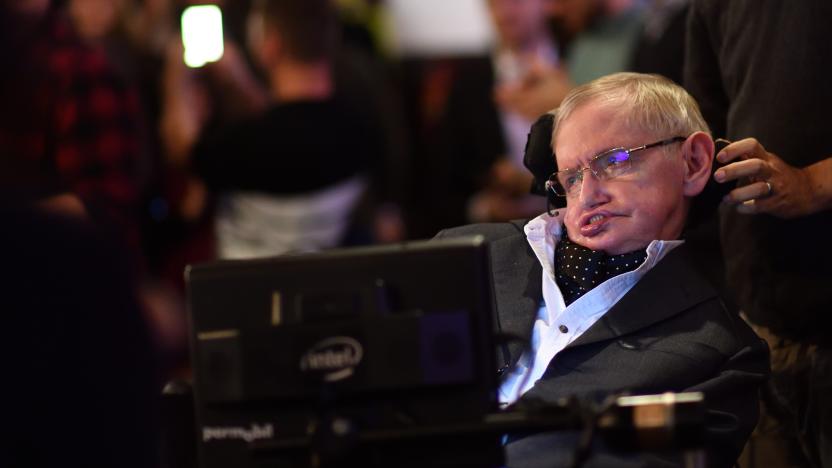
Stephen Hawking's last paper on black holes is now online
Stephen Hawking never stopped trying to unravel the mysteries surrounding black holes -- in fact, he was still working to solve one of them shortly before his death. Now, his last research paper on the subject is finally available online through pre-publication website ArXiV, thanks to his co-authors from Cambridge and Harvard. It's entitled Black Hole Entropy and Soft Hair, and it tackles the black hole paradox. According to Hawking's co-author Malcolm Perry, the paradox "is perhaps the most puzzling problem in fundamental theoretical physics today" and was the center of the late physicist's life for decades.

A Stephen Hawking musical tribute was beamed directly at a black hole
The European Space Agency had its own special way of marking a memorial service for astrophysicist Professor Stephen Hawking. At the same time his ashes were interred at Westminster Abbey in London, the ESA beamed music featuring Hawking's famously synthesized voice towards the closest-known black hole.

Stephen Hawking’s last paper has been published on multiverse theory
The last paper Stephen Hawking wrote before he died has now been published in the Journal of High Energy Physics. Though some version of the paper has been available on the preprint site arXiv since last year, it was submitted to the journal for review just days before Hawking passed, and it deals with some theoretical physics about the many universes that might have been created by the Big Bang.
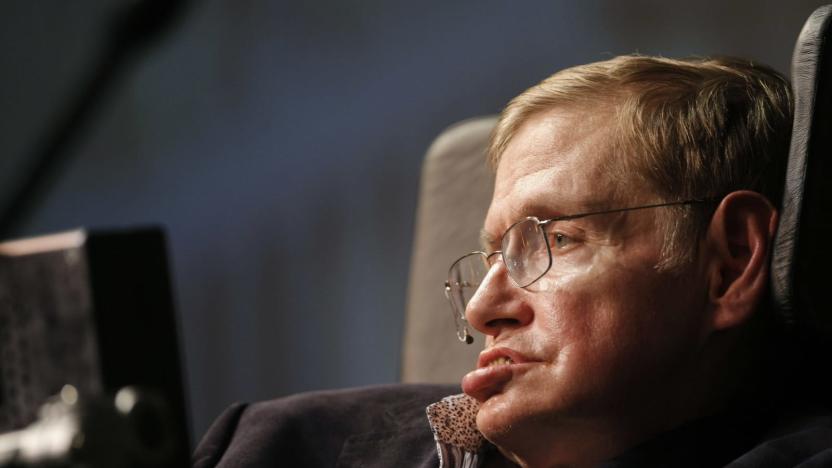
Recommended Reading: Saving Stephen Hawking's voice
The quest to save Stephen Hawking's voice Jason Fagone, San Francisco Chronicle There's no doubt Stephen Hawking will be remembered for his work on black holes and relativity, but he will also be remembered for his distinctive voice. San Francisco Chronicle tells the story of the Silicon Valley team that helped create, and later save, the physicist's iconic sound.
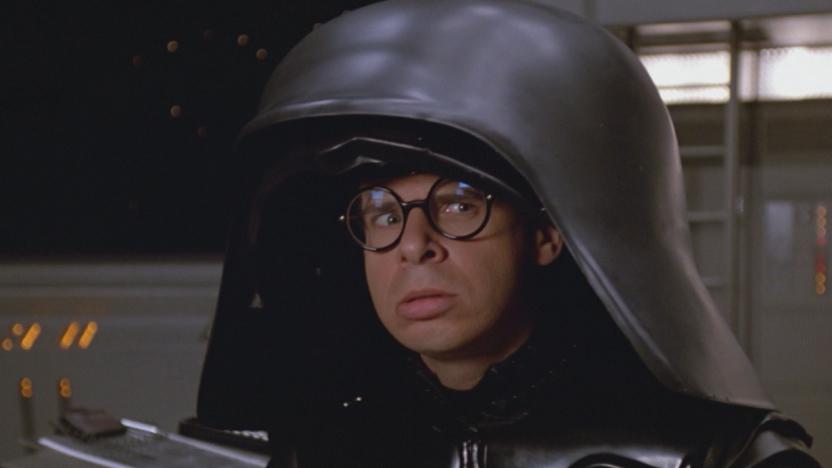
After Math: Space Farce
It was a parabolic week for space nerds. The president teased the creation of a fourth military branch dubbed the "Space Force," world-renowned astrophysicist Stephen Hawking passed away at the age of 76, and NASA's acting chief retired without someone ready to succeed him. But hey, at least to listen to Elon Musk's Wonka-esque visions for the future of spaceflight during his sold out SXSW keynote. Numbers because the only thing harder than math is space.

Stephen Hawking passes away at age 76
Late Tuesday night the family of Stephen Hawking announced that the physicist has passed away at the age of 76. Awarded more than a dozen honorary degrees, Hawking theorized that black holes emitted a form of thermal radiation, and contributed to work trying to unify Einstein's theory of relativity with quantum physics. In 1988 he wrote "A Brief History of Time," serving as an overview of astronomy and modern physics, which went on to sell more than 10 million copies, spurring a biographical documentary directed by Errol Morris and produced by Steven Spielberg. In 2014, Eddie Redmayne won a best actor Oscar for his portrayal of Hawking in The Theory of Everything, based on accounts of his early life by his first wife Jane Hawking.
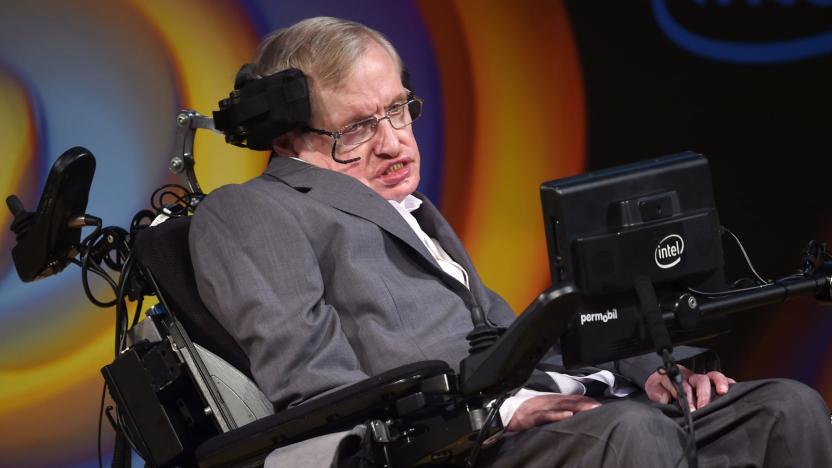
Stephen Hawking makes his doctoral thesis available online
Ever wondered how Stephen Hawking saw the universe as a doctoral candidate, when his theories about black holes were just coming into fruition? You don't have to hear about it second-hand -- you can now go straight to the source. The legendary cosmologist has published his 1966 doctoral thesis online for anyone to read, making it available to the public for the first time. Hawking is posting his work in hopes that it'll spark interests in both space itself and sharing research. "I hope to inspire people around the world to look up at the stars and not down at their feet," he said.
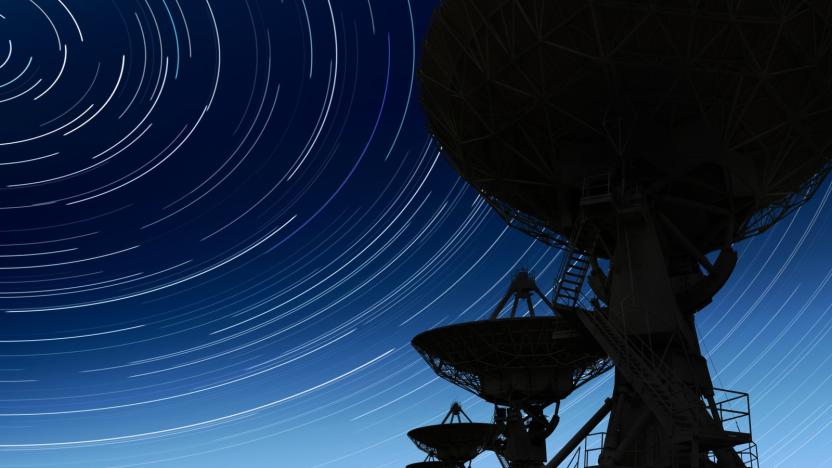
Listening to starlight: Our ongoing search for alien intelligence
Six hours a day, seven days a week, for four straight months. That's how long radio astronomer Frank D. Drake pointed the 26-meter telescope at the National Radio Astronomy Observatory (NRAO) research facility in Green Bank, West Virginia, toward the heavens, looking for signs of intelligent life beyond Earth. He dubbed his efforts Project Ozma, in honor of the Queen of Oz from L. Frank Baum's famed children's book series.

Apple's new solar-powered campus, and more in the week that was
As the founder of Tesla, Elon Musk is a proponent of clean technology and renewable energy. That's why it's so surprising that Donald Trump has selected Musk to serve as a strategic advisor -- here's hoping Musk can convince the President-elect to take climate change seriously. In other news, Chevrolet just delivered its first batch of Bolt EVs to customers in the San Francisco Bay Area, beating Tesla's Model 3 to the punch. Steven Hawking is working with NASA to launch a self-healing starship that will search for habitable planets in Alpha Centauri. And Japan Airlines has developed a way to transform old clothing into jet fuel.

NASA is helping Stephen Hawking get a tiny ship to Alpha Centauri
NASA is helping Stephen Hawking and Russian venture capitalist Yuri Milner with the monumental task of getting a tiny probe to Alpha Centauri, the nearest star system to Earth. Project Starshot aims to propel a lightweight silicon "StarChip" to one-fifth the speed of light by hitting it with lasers from Earth, getting it to the star within 20 years. The space agency will help solve one of the thorniest problems -- the intense radiation of interstellar travel.

The world's fastest electric car, and more in the week that was
Tesla finally sealed the deal on its acquisition of SolarCity this week, and the merger is already producing incredible results. The two companies just completed a project to power an entire island on solar power. In other energy news, researchers in Israel developed found a way to make solar panels 70 percent more efficient. Two Chinese companies are building a massive solar plant in the exclusion zone near the Chernobyl nuclear reactor. And Sweden announced plans to cut its tax on solar energy by 98 percent.

Stephen Hawking warns humans may have only 1,000 years left on Earth
Renowned theoretical physicist Stephen Hawking spoke at the Oxford Union earlier this week, and the headline takeaway from the speech has been a statement that humanity needs to find a new place to live, and fast. The Daily Mail reports the professor told attendees "I don't think we will survive another 1,000 years without escaping our fragile planet," but really, there's at least one reason for optimism. As one of the greatest minds alive, Hawking has been making this prediction for years, and hysteria over recent events doesn't appear to have affected his timeline (yet). He made the same claim, word for word, during a speech at Cedars-Sinai Hospital in 2013.

A lab-made black hole supports longstanding Hawking theory
In 1974, Stephen Hawking put forward a hypothesis suggesting radiation can escape the light-sucking grip of a black hole. This week, and over forty years later, newly published research claims to have observed "Hawking radiation" (as it is known) in lab conditions. How do you observe the mother of cosmic monsters in a science lab? With a sonic black hole, a commonly used analogue (that doesn't swallow your research lab).

We don't understand AI because we don't understand intelligence
Artificial intelligence prophets including Elon Musk, Stephen Hawking and Raymond Kurzweil predict that by the year 2030 machines will develop consciousness through the application of human intelligence. This will lead to a variety of benign, neutral and terrifying outcomes. For example, Musk, Hawking and dozens of other researchers signed a petition in January 2015 that claimed AI-driven machines could lead to "the eradication of disease and poverty" in the near future. This is, clearly, a benign outcome. And then there's the neutral result: Kurzweil, who popularized the idea of the technological singularity, believes that by the 2030s people will be able to upload their minds, melding man with machine. On the terrifying side of things, Musk envisions a future where humans will essentially be house cats to our software-based overlords, while Kurzweil takes it a step further, suggesting that humans will essentially be eradicated in favor of intelligent machines.

Inhabitat's Week in Green: The Tesla Model S gets an upgrade
The Tesla Model S is one of the highest-rated electric cars ever, and it just got even better. This week the automaker rolled out an upgrade that gives the vehicle a bigger battery, a refreshed exterior and a "bioweapon defense mode." Meanwhile, the Solar Impulse sun-powered airplane is getting set to fly across the Pacific Ocean after a lengthy stop in Hawaii. Stephen Hawking teamed up with Russian billionaire Yuri Milner on a plan to send postage-stamp sized spaceships to Alpha Centauri in search of life. IKEA announced plans to launch a chainless bicycle later this year, and a popular new bike/stroller hybrid hit the market only to sell out in a matter of hours.

'Starshot' plan gets probes to Alpha Centauri in your lifetime
The concept of exploring other star systems with probes (and not just telescopes) has proven elusive for one good reason: even the fastest spacecraft would take 30,000 years just to reach Alpha Centauri, our closest neighboring star. However, investor and space project enthusiast Yuri Milner thinks it's possible to do better. He and physicist Stephen Hawking have launched Breakthrough Starshot, a $100 million program that aims to get probes to Alpha Centauri within a generation. If all goes well, the observers would reach the relatively close-by system (4.4 light years away) within 20 years of leaving Earth.
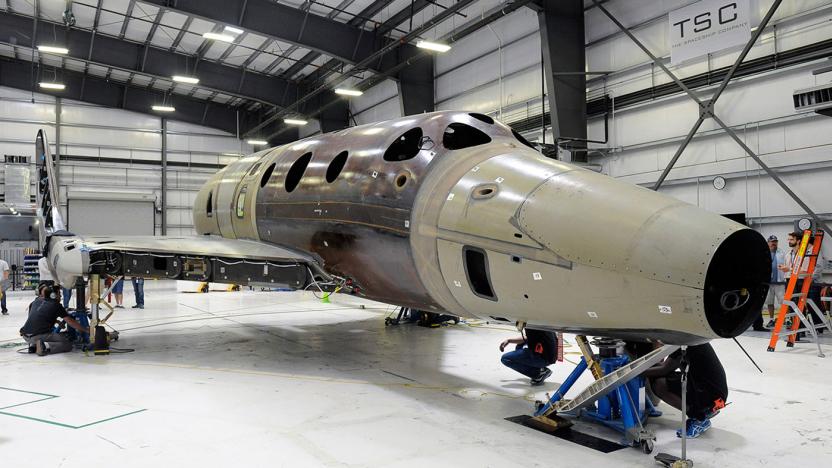
Virgin Galactic debuts the next SpaceShipTwo on February 19th
Virgin Galactic is still reeling from the tragic loss of a crew member in its 2014 SpaceShipTwo crash, but it's nearly ready to soldier on. The private spaceflight pioneer is rolling out and naming the second version of SpaceShipTwo on February 19th, roughly 15 months following the accident. The new machine is largely similar to its predecessor, but it reflects the lessons learned from its predecessor: it has safety measures that should prevent the tail booms from extending prematurely and throwing the craft out of control.

ICYMI: The Martian colony plan, simulated rat brain and more
#fivemin-widget-blogsmith-image-424179{display:none;} .cke_show_borders #fivemin-widget-blogsmith-image-424179, #postcontentcontainer #fivemin-widget-blogsmith-image-424179{width:570px;display:block;} try{document.getElementById("fivemin-widget-blogsmith-image-424179").style.display="none";}catch(e){}Today on In Case You Missed It: We are rounding up Space Week with NASA's detailed plan to get earthlings to settle on Mars. Meanwhile other scientists teamed up to unravel how a rat's brain works, to then simulate it with a computer. Early testing shows how calcium affects the brain in a way that can only help with studies on neurological disorders. And Disney is jumping into more augmented reality with a coloring book app that brings creatures to life while they're worked on.

Stephen Hawking: 'The real risk with AI isn't malice but competence'
Artificial intelligence was one of the biggest topics during Stephen Hawking's Reddit AMA (Ask Me Anything) earlier this year. So it's not too surprising that Hawking used up a significant portion of his answers to that Q&A session, released by Reddit yesterday, by clarifying his stance on dangerous artificial intelligence. "The real risk with AI isn't malice but competence," he wrote to a teacher who's tired of having the "The Terminator Conversation" with his students -- that is, explaining away the notion that evil, killer robots will be the main danger with AI. "A superintelligent AI will be extremely good at accomplishing its goals, and if those goals aren't aligned with ours, we're in trouble." Hawking previously warned that AI could "spell the end of the human race," and he also joined Elon Musk and other notable technologists to call for a ban on autonomous weapons.

Stephen Hawking believes he knows how information escapes black holes
Stephen Hawking announced during a lecture at the KTH Royal Institute of Technology in Stockholm, Sweden on Tuesday that he has potentially solved the Information Paradox. The paradox a conflict between the quantum mechanics and general relativity models that has vexed physicists for more than four decades. The Information Paradox arises from black holes -- specifically what happens to information about the physical state of objects that fall into one. The quantum mechanical model posits that the information remains intact while general relativity argues that it is indeed obliterated under the black holes immense gravitation. But Hawking has developed a third opinion: the information never actually makes it into the black hole. "I propose that the information is stored not in the interior of the black hole as one might expect, but on its boundary, the event horizon," he said.












